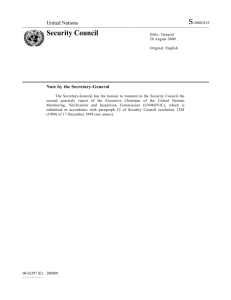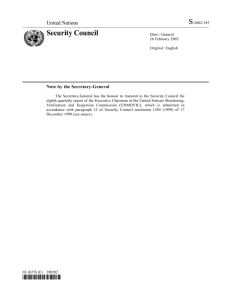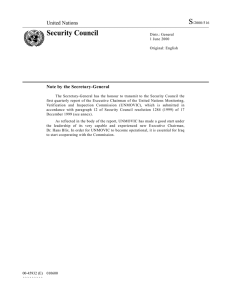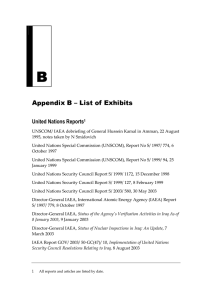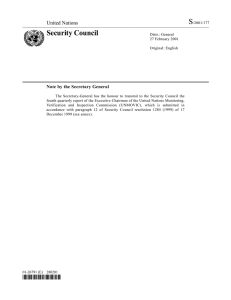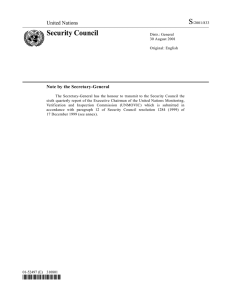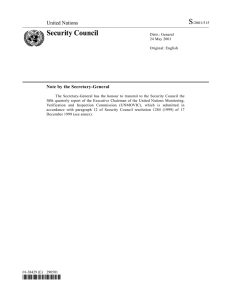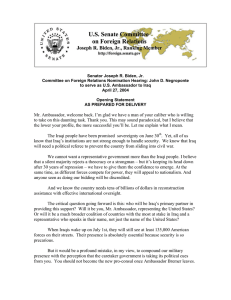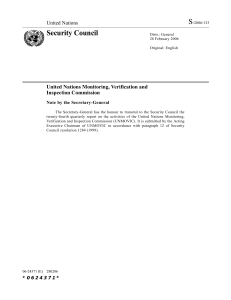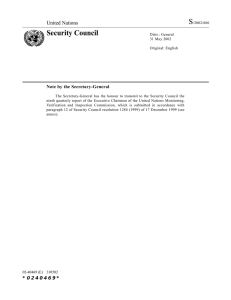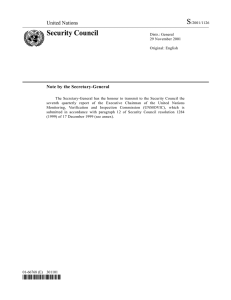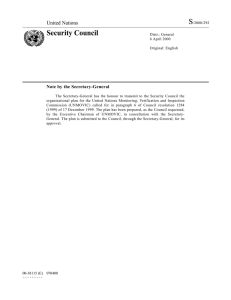S Security Council United Nations
advertisement
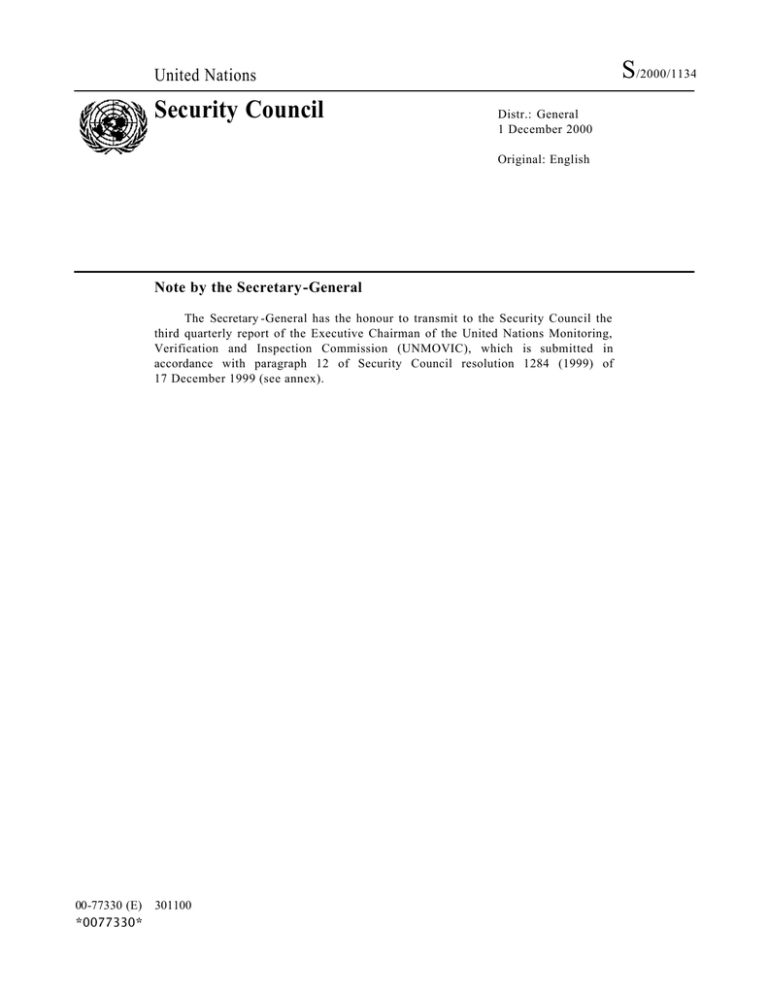
S/2000/1134 United Nations Security Council Distr.: General 1 December 2000 Original: English Note by the Secretary-General The Secretary -General has the honour to transmit to the Security Council the third quarterly report of the Executive Chairman of the United Nations Monitoring, Verification and Inspection Commission (UNMOVIC), which is submitted in accordance with paragraph 12 of Security Council resolution 1284 (1999) of 17 December 1999 (see annex). 00-77330 (E) 301100 *0077330* S/2000/1134 Annex Third quarterly reportª of the Executive Chairman of the United Nations Monitoring, Verification and Inspection Commission unde r paragraph 12 of Security Council resolution 1284 (1999) Introduction 1. The present report, which is submitted in accordance with paragraph 12 of Security Council resolution 1284 (1999), covers the activities of the United Nations Monitoring, Verification and Inspection Commission (UNMOVIC) in the period from 1 September to 30 November 2000. Issues considered by the College of Commissioners 2. The third meeting of the College of Commissioners was held at United Nations Headquarters, from 27 to 29 November 2000. As on previous occasions, in addition to the members of the College, observers from the International Atomic Energy Agency (IAEA) and the Organization for the Prohibition of Chemical Weapons (OPCW) attended. 3. The principal issue discussed by the Commissioners was preparations for the commencement of work by UNMOVIC in Iraq. Under this item, the main point was the time -frame for UNMOVIC activities in Iraq, within the meaning of Council resolution 1284 (1999), in particular paragraphs 7, 12 and 33. Discussion of this issue will continue. 4. The College welcomed the suggestion of the Chairman that it would receive and discuss at its next session a draft inventory of unresolved disarmament issues prepared by UNMOVIC staff, or at least a progress report on current work on the subject. 5. The Commissioners were consulted on and supported principles for sampling and analysis, which would form the basis of detailed guidelines for such activities with respect to Iraq. The College was also briefed on the oil-for-food programme by a representative of the Office of the Iraq Programme. 6. Briefings were given, one by UNMOVIC staff, another by the observer for IAEA, which was followed by discussion on overhead imagery. A further briefing 2 will be provid ed by UNMOVIC staff at the next session. 7. In accordance with paragraph 5 of Council resolution 1284 (1999), the College of Commissioners was consulted on the contents of the present report. The College set 21 and 22 February 2001 as the dates for its next meeting. Briefings and consultations by the Executive Chairman 8. In the period under review, the Executive Chairman continued his practice of providing monthly briefings to the Presidents of the Security Council. In addition, he has travelled to a number of capitals and held consultations with representatives of the Governments of China, Japan, Singapore, Malaysia, Bahrain, France and the Russian Federation. The Chairman was encouraged by the consistent expression of support for the implementation of the mandate of UNMOVIC under resolution 1284 (1999) and for the preparatory work undertaken so far. He also held talks with the Director General of IAEA and the Director General of OPCW, in order to consult with them and to draw on the expertise and exp erience of IAEA and OPCW. 9. The Commission seeks to continue its preparatory work in a transparent manner. Apart from frequent contacts with permanent missions in New York and visits by the Executive Chairman to the capitals of the Member States mentioned above, UNMOVIC is preparing a web site and has distributed a first newsletter to all experts who have undergone UNMOVIC training, as well as all members of the College of Commissioners. A lecture given by the Executive Chairman at the second UNMOVIC train ing course, held in France on 7 November, has been provided to members of the Security Council and the College of Commissioners. S/2000/1134 Recruitment 10. Recruitment has taken place for most of the positions needed at the present stage of work for the New Yo rk-based core staff, which comprises 43 persons, of whom 10 are women, from 20 Member States. In addition, there are 23 persons on the roster of trained and qualified inspectors. Training 11. The second month -long training course conducted by the Commission commenced on 7 November and will finish on 8 December. Fifty -eight persons, encompassing some 23 nationalities, are taking part. Like the first training course, it covered general lectures on the mandate of UNMOVIC, its rights and obligations, the proscribed weapons programmes of Iraq and discipline -specific training. In addition, in conformity with paragraph 6 of Council resolution 1284 (1999), participants in the course were provided with training regarding the history, religion and culture of Iraq. With the completion of the second training course, UNMOVIC expects to have on the roster 49 additional persons who are trained and qualified for work in Iraq. 12. The Commission expresses its gratitude to the lecturers who gave their time without fee, and also to the Government of France which provided facilities and personnel for health and safety training, as well as visits to sites relevant to the study of various weapons disciplines and technologies. 13. Preparations are under way for a third trainin g course. In order to ensure a sufficient number of candidates, the Commission, in a letter dated 8 November 2000, has again requested the assistance of Member States in identifying suitable persons who might be available to work for UNMOVIC as inspectors or support staff and to participate in this course. Other activities 14. The staff of the Commission, in consultation with experts from IAEA, have continued to revise and update the lists of dual-use items and material to which the export/import monitoring mechanism, approved by the Security Council in its resolution 1051 (1996), applies. The College will be given information, early in 2001, on the progress made with regard to such revisions. In addition, the joint UNMOVIC/IAEA unit, reconstituted in accordance with paragraph 8 of Council resolution 1284 (1999), has continued to receive notifications of exports to Iraq of dual-use goods subject to the provisions of Council resolution 1051 (1996). 15. A number of other activities are under way within UNMOVIC, in preparation for the resumption of inspections in Iraq. These activities include studies to determine the priority of sites to be inspected and the formats of reporting from the field. The formats for declarations by Iraq are also being reviewed and revised, with a view to standardizing them across the weapons disciplines and making them more userfriendly for Iraq and more useful for the Commission. One element of this work is to plan for the analysis of declarations that the Government of Iraq should have provided since December 1998 and that should become available upon the resumption of inspections. As such declarations may be voluminous, the Commission is studying how to examine them swiftly, so that unnecessary delay in commencing inspections for the re -establishment of the baseline is avoided. Other studies aim at the identification of sites at which dualuse items may have been installed or used since December 1998. Regular interaction with IAEA is taking place on some of these technical issues. 16. The work involved in these studies is substantial, since it requires staff to become familiar with the monitoring and inspection activities undertaken by the former Special Commission of the Council, in order to see where improvements can be made, both in terms of the efficacy of inspections and efficient use of resources for both the inspectors and the Government of Iraq. 17. Work involving new staff is continuing in order to identify and draw up an inventory of unresolved disarmament issues, by reviewing the assessments made by the Special Commission and reported to the Council and carefully analysing the original material upon which such assessments were made. Studies are also being conducted into how the Commission can usefully employ different types of imagery in support of its mandate. 18. Work on the elaboration of inspection guidelines and procedures for use in the field continues. This 3 S/2000/1134 activity, aimed at producing a handbook for inspectors, has been discussed in the College of Commissioners and has been welcomed by it. 19. Communications equipment (for use both in Iraq and between Baghdad, New York and Vienna) and a variety of sensors for use in the field are currently being evaluated by the Commission’s experts. Lists of other logistics needs , including equipment needed for inspections, are also being drawn up. The expansion, organization and security of the database remains an important ongoing task for the Commission’s staff. 20. From the foregoing paragraphs, it is evident that UNMOVIC has increased its readiness to carry out its mandated activities. Premises 21. Discussions with the Government of Bahrain concerning an arrangement for the siting of a field office there, have reached an advanced stage. 22. To alleviate the overcrowding in the UNMOVIC premises in the main Secretariat building and to allow recruitment to vacant posts, the Commission has acquired additional office space in a nearby building, which it hopes to occupy in the new year. Notes a 4 The Commission’s previous quarterly reports were issued as documents S/2000/516 and S/2000/835.
